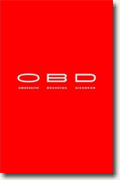OBD: Obsessive Branding Disorder
Lucas Conley
book reviews:
· general fiction
· chick lit/romance
· sci-fi/fantasy
· graphic novels
· nonfiction
· audio books
· author interviews
· children's books @
curledupkids.com
· DVD reviews @
curledupdvd.com
newsletter
win books
buy online
links
home
for authors
& publishers
for reviewers

 |
OBD: Obsessive Branding Disorder: The Illusion of Business and the Business of Illusion Lucas Conley PublicAffairs Hardcover 240 pages June 2008 |
|
In the first paragraph on the first page of his introduction, Lucas Conley delivers a shocking revelation about the power of branding: some Japanese women, he tells us, are foregoing motherhood in favor of Louis-Vuitton products. Never mind that ninety-four percent of young Japanese women already own these non-essential products – we could easily compare that to the non-essential cable television service owned by even the poorest U. S citizens – but consider the astounding notion that a cleverly crafted marketing strategy has convinced a generation of women that purses mean more than children! Can it be true - and if it is, how did we come to such a state?
According to Conley, the Japanese obsession with the Louis-Vuitton merchandise is a symptom of what he terms a “global branding disorder” that has the power to shape our society and even our sense of self. In fact, one might argue that such a revolution has already occurred and that we are all mindless zombies, shambling to the malls in order to feast, not on the blood or souls of the living, but on the must-have gizmos and gadgets with the most compelling marketing campaigns. We are, points out Conley, “a society increasingly warped by an obsessive disorder.” For proof, he offers stranger-than-fiction anecdotes about the branding of cities (millions spent to promote tourism in post-Katrina New Orleans while thousands of residents are still homeless and the crime rate soars); the infiltration of branding into our entertainment (also known as product placement); and the collaboration of the ordinary housewife with the marketing masters (word-of-mouth product recommendations made by children and their mothers who are paid to advertise toys and cleaning products). As more and more products become available and advertising gimmicks reach new heights of absurdity, such devious measures are not only necessary but expected. Never mind the quality of a given product – what matters is the cleverness of the pitch and how thoroughly the marketing message is absorbed by consumers. The business of branding is all about shaping the consumers’ perception. As much as we’d like to think we’re rational beings, the truth is that we build logical arguments to support the purchase of items we’ve already decided to buy, and that decision is purely emotional. Marketers know this and have only to ignite the emotional response through ads that appeal to our vanity and insecurity. Page after page, Conley serves up examples of marketing madness that most readers will find both riveting and revolting. Are we really so gullible? I’d prefer to think not, but what other explanation can there be for the popularity of cell-phone jewelry? We must remember that, many years ago, Valentine’s Day was deliberately constructed to boost sagging post-Christmas sales. Even though we know this, and we recognize that we are being played, most of us continue to spend large sums of money on candy and jewelry for this dubious holiday. Filled with facts and fun tidbits, OBD Originally published on Curled Up With A Good Book at www.curledup.com. © Deborah Adams, 2008 |
|
|
|
 Click here to learn more about this month's sponsor! |
|
| fiction · sf/f · comic books · nonfiction · audio newsletter · free book contest · buy books online review index · links · · authors & publishers reviewers |
|
| site by ELBO Computing Resources, Inc. | |
 Journalist Lucas Conley, who has written for the Boston Globe, ESPN magazine, and Fast Company, gives us an inside look at just how professional marketers brainwash consumers. From clever ads to insidious marketing strategies to surreal promotions, he shines a light on the masterminds of manipulation and, in the process, illuminates our participation in our own seduction.
Journalist Lucas Conley, who has written for the Boston Globe, ESPN magazine, and Fast Company, gives us an inside look at just how professional marketers brainwash consumers. From clever ads to insidious marketing strategies to surreal promotions, he shines a light on the masterminds of manipulation and, in the process, illuminates our participation in our own seduction.